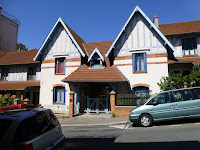(Side note: if your child is aged 10 or under, (s)he can be enrolled directly at la mairie, without having to go through the testing process.)
The program presented by the CASNAV seems to be a ideal way to get children fluid in French as quickly as possible, and offers extra support in writing and grammar at the appropriate levels for those who need it. It enjoys a positive reputation in Paris: anecdotally, my nephew's step-daughter came to Paris at age 11 from the Ukraine, not speaking a word of French. She went through a year of the program before being integrated into a regular classroom. He and his wife were very satisfied with how quickly their daughter learned French. It is true that children will pick up an oral language quite quickly when they are immersed in that language - the writing/reading part isn't quite as easy, and it is here that the CASNAV is helpful.
Since we live slightly more than an hour away by metro from the testing center, our goal was to leave at 7 to get there about 8 for an opening at 9.
Unfortunately, things didn't happen that way. In the early morning, before my 2 cups of tea, and before the sun rises, I don't function very well, and I managed to trip on the sidewalk just outside the apartment, ripping open my hands and knees. By the time the blood was cleaned up it was already 830.
We almost didn't go, but then I thought that if we did, at least we'd know exactly where this center was located.
By the time we arrived, at 940, there were very few people around the entryway. So, I walked in and was questioned by a guard (did I have all my paperwork, including multiple photocopies, stamps, envelopes, double proof of residence, etc. etc.??) I had the necessary documents and we were let in, and I was given a number.
Little did I know that over 200 families, some waiting since 6 am, had been asked to come back the following day, but then extra personnel had been called into action, and I, and about 30 other people had made the cut after 9 am.
Talk about luck! I can't imagine having to wait in line for 3 hours in the dark, chilly morning.
A. was taken into a room with 50 other children (there were several rooms,) and I began a long wait. I found out that there were families from the Congo, Ukraine, Iran, Iraq, Tunisia, Brazil, Romania, Bulgaria, Holland, Morocco, Poland, and who knows from where else. Their level of French understanding ranged from excellent (the Tunisian family had had their children in Franco-Tunisian schools,) to minimal (the family from Brazil was here for PhD research for 6 months, and their 16 year old son was not happy about leaving his friends behind, and was refusing to speak anything other than Portuguese.)
Two and a half hours later the testing was done, and A. had a perfect score in math- they had gone through the tests for middle school, and did not go any further. The testing agent came out with him, and said that they didn't really know where to place him. So she went to talk to her supervisor, who came out and said, "let's go to the main center, where we will talk to the person who is in charge of placing all children in the various "colleges" (middle schools) in the city." Both of these women insisted on their desire to have this year be a positive experience for A., one in which he would not be bored, but would also allow him to make friends and be appropriately challenged. After what seemed to be a lengthy conversation (maybe 20 minutes,) they came out and said that he would be put in a regular classe de 5eme (7th grade equiv.), but they didn't know where, and that I would get the results before the 10th of Sept. The woman who tested A. even went as far as to give me her personal email address, as she asked me to let her know if A. was happy in school this fall. What an amazing show of kindness. I was very impressed. It was a completely different scenario from the one I experienced many years ago when it was time to get my residency papers after getting married. Not all bureaucrats are indifferent, and this is comforting to know.
Now we are in a waiting mode, and should find out in the next week where A. will go to school.







